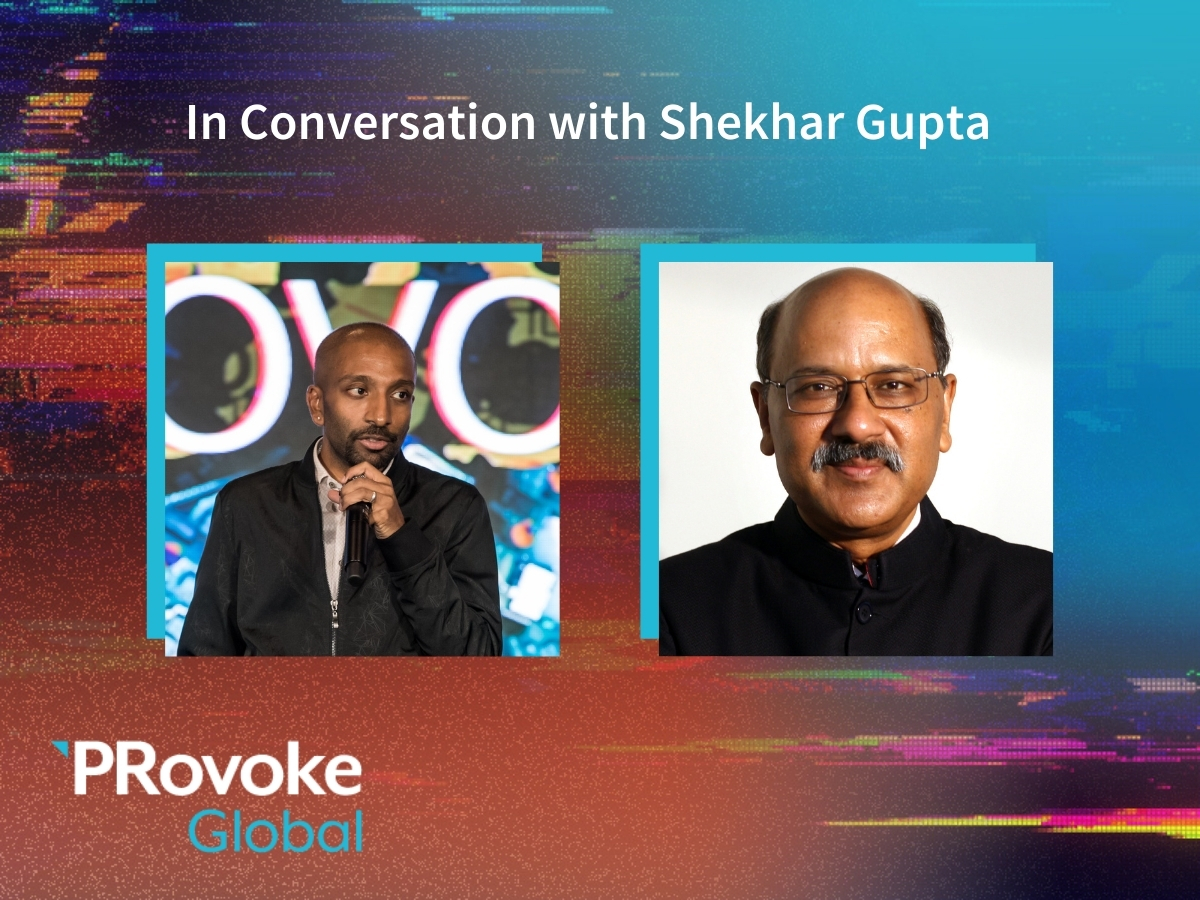Paul Holmes 22 Oct 2020 // 2:53PM GMT

On the closing day of PRovoke Global, veteran Indian journalist Shekhar Gupta—chairman and editor-in-chief of ThePrint—provided a valuable international perspective on political issues related to his native India, neighbor China, the United States, the rising tide of nationalism around the world, and the ways in which those geopolitical forces may impact business.
Gupta appeared in conversation with PRovoke Media editor-in-chief Arun Sudhaman, who began by interrogating the idea—one that was given voice in the early days of the conference—that the 21st century will be a “Chinese century.”
Said Gupta, “It’s a China-centric world but not necessarily for good reasons. Until three years ago, everyone in this region talked about the peaceful rise of China, and China talked about the peaceful rise of China. But over the last three years China has changed that equation, and for the rest of the world and for China’s neighbors, that was really a rude surprise.
“It’s one thing to stir up trouble at the United Nations, or to make trouble in trade, but to mass tanks and artillery and fighter plans at the border—there are no 60 or 70,000 Chinese troops on our border—that is something very different. And as we look what they are doing in the South China Sea and Taiwan, you have to ask whether they think they can redraw the map of the world.
“Much of it looked like talk, but this is real. It’s the first time in 50 years it has escalated like this, and the uncertainty about where Chi is coming from makes this an even ruder surprise.”
Another reason for the China-centric shift, Gupta suggested, is the declining influence of the US. Asked about the upcoming elections, he demurred from predicting a winner but did express a view on how the world was looking at the contest between incumbent Donald Trump and challenger Joe Biden.
“I don’t see that any friends of America will be unhappy to see Trump go,” he said. “All the rivals of America will be unhappy to see Trump go. For China and Russia, Trump has been wonderful because he has broken up American alliances and weakened American power. And that strengthens China and Russia.”
One exception to that general view, however, is Gupta’s own country, where support for Trump is high.
“The USA is still very popular in India,” he said. “Trump is very popular in India, especially among the supporters of [current Indian prime minister Nahendra] Modi. People link Trump with Modi. And very often people in India see things in terms of Pakistan or in terms of China, and on those issues Trump is seen standing up to Pakistan and China. He talks strongly. He doesn’t deliver, but he talks.”
As for India itself, Gupta suggested that Modi is in a unique position among the generation of nationalist leaders who have risen to power in recent years.
“Trump has become unpopular in America. Other nationalists around the world have their challenges. Modi on the other hand is unique. India’s economy will decline by 10.5% this year after years of growth, and yet you don’t find the kind of disaffection that could bring the government down. Where there is anti-incumbency it is at the local level, but Modi’s stock is higher.”
As a result, he said, “compared to five years ago, brand India has suffered.”
Despite the negative impact on brand India, Gupta said, Indian companies have largely declined to criticize the Prime Minister.
“They’ll whisper on the side, but they’ll never say anything in public. This happens every year at the time of the budget. Indian tycoons on TV will rate the budget eight, nine, ten out of ten. Given half the chance they’ll rate it 12 out of ten. But the moment the camera goes they start bitching, and asking what the hell they are doing.
“Corporate India does not have a spine. They have excuses. They say they can’t work without the government.”
Gupta was equally forthright when Sudhaman asked about the current anti-globalization backlash, which has seen Chinese apps banned in India and US, and American brands challenged to take a stand on human rights issues in China.
“People blame Donald Trump for the end of globalization,” said Gupta. “But the death blow to globalization is being dealt by China, because they see globalization as domination by one country, and because China comes into the discussion with a different style of leadership. If America doesn’t like Donald Trump they have a chance to vote him out. That’s not the case in China.”
Despite those concerns, however, Gupta is optimistic that the current trend of nationalism is a blip rather than a complete reversal of the progress of the past half century.
“It’s a cycle. That’s how public opinion works,” he said. “Although that might be wishful thinking because I prefer globalization to nationalism. But the reality is that people are living better across the world because of globalization. Incomes have gone up all over the world. Life expectancy has gone up all of the world. The burden of disease has gone down all over the world. Is that what you want to go back to?”
As for the role of business, “I don’t think business can stay neutral,” he said. “I don’t think we can expect companies to be like us as editors taking risks to defend freedom of speech. But their fortunes are tied to governments, and to national interests in the countries. You now see very liberal European countries getting worried about 5G and China’s control over telecoms and infrastructure. Trust is gone. And companies need to understand that.”


































.jpg)




.tmb-135x100.jpg)



.tmb-135x100.jpg)








